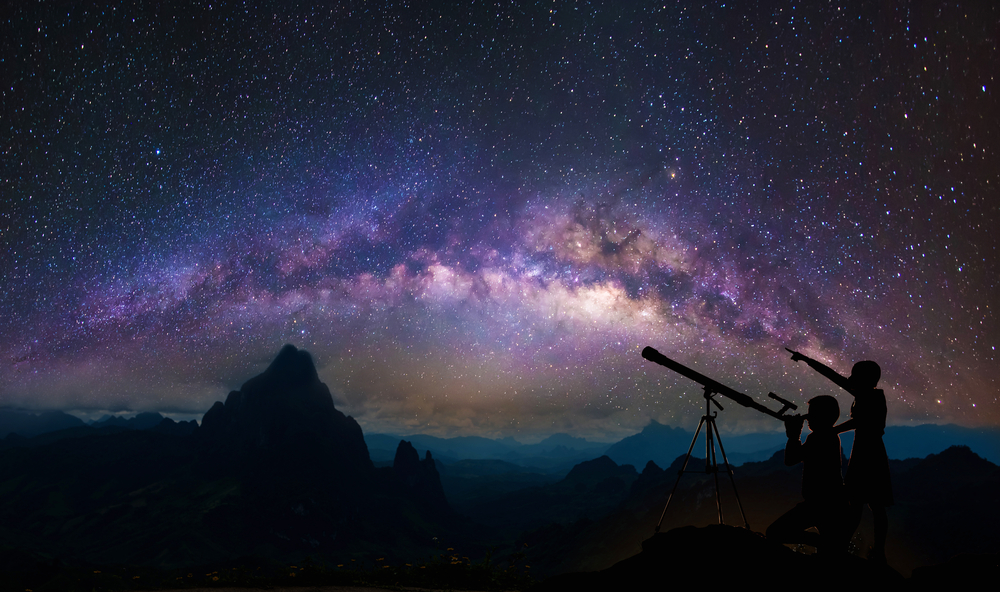In the poem “Astronomy Lesson” by Alan Shapiro, two boys lean over their front porch railing and look up at the stars. Their mother and father are watching television shows in separate rooms, the sets “turned up high and higher till they / each can’t hear the other’s show.”
Alone, the minds of the boys wander. One boy says “no matter / how many stars you counted there were / always more stars beyond them / and beyond the stars black space going on forever in all directions.” He explains that no matter how far someone traveled, they’d “be no closer to the end / of it than they were now / here on the porch on Tuesday night / in the middle of summer.”
The boys are surrounded by earthly sounds: the televisions booming behind them, and a woman in the street below, “calling to her stray cat or dog, / clapping and whistling it in.” In the distance, “sirens now and again veer in and out of hearing.” Yet the boys always return to the possibilities of space: “solar winds, black holes, / and how the sun is cooling / and what will happen to / them all when it is cold.”
The night sky makes us feel near and far; special and insignificant. Astronomy is a populist science — we’re surrounded by space, lit by the moon, and inspired by stars, so why not pay closer attention? Scanning the heavens is a way to cultivate a sense of wonder, humility, and spirituality.
Fantastic stories of UFOs and aliens are entertaining, but there’s a beautiful, mysterious, and prosaic world of space right in front of us. There’s a good reason why people have always charted the sky, and gazed up to pray. In looking up, we are prostrated — an act of humility. We can’t help but feel small.
Space is vaster than we can comprehend, and can disorient us. That’s a good thing. Prayer is often renewed by a new perspective, and by starting at the stars, we slow our thoughts and practice an ancient art. Like the boys in Shapiro’s poem, the distance and light of the stars compels us to open our minds to wonder — a ripe mixture for prayer. If we ever doubt God’s presence, a few moments staring into the space above us can serve as a tangible reminder.
A few months ago, I gave my childhood telescope, a Bushnell, to my daughters. I want them to look up and look out. A little time in front of the stars has become as habitual as nightly prayers — a gentle escape from this world into a place of mystery and wonder. They want to go to planetariums and learn about our complex universe. The telescope brings the heavens closer to them, teasing out their imagination.
But astronomy shouldn’t be a temporary interest for kids; it should be something that adults look forward to after a long day of work of school. We can pull a chair up to a window, or go out on a deck or balcony. Sit down, open our eyes, and search the sky. There’s so much to see it is almost overwhelming — but why aren’t we letting ourselves be blessedly overwhelmed? The majestic sky spans above us every night, and to not appreciate it feels like forsaking God’s creation.
Father Angelo Secchi, the 19th century Jesuit astronomer, wrote that “Even scientific intelligence is one of the gifts of the Holy Spirit.” He hoped that astronomers would “seek only to understand the works of the Lord — to know his greatness and our duty.” His words extend to the amateur astronomers among us. Astronomy can be a prayer of wonder and gratitude — recognition of our beautiful, boundless, and often unknowable world.
Nick Ripatrazone has written for Rolling Stone, Esquire, The Atlantic, and is a contributing editor for The Millions. He is writing a book on Catholic culture and literature in America for Fortress Press.
Start your day with Always Forward, our award-winning e-newsletter. Get this smart, handpicked selection of the day’s top news, analysis, and opinion, delivered to your inbox. Sign up absolutely free today!

